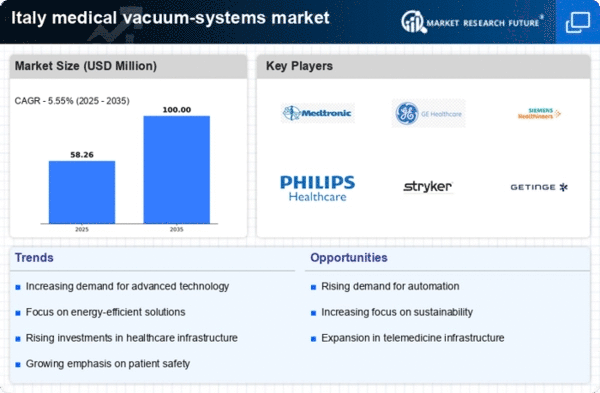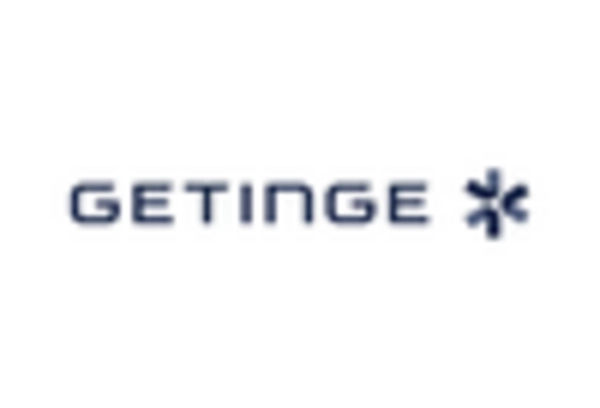Aging Population
Italy's demographic trends indicate a rapidly aging population, which is expected to have a profound impact on the medical vacuum-systems market. By 2025, it is projected that over 23% of the Italian population will be aged 65 and older. This demographic shift is likely to increase the demand for healthcare services, particularly in hospitals and long-term care facilities. As older adults often require more medical interventions, the need for effective suction systems in surgical and therapeutic procedures becomes paramount. Consequently, the medical vacuum-systems market may see a surge in demand as healthcare providers adapt to the needs of an aging population, ensuring that they have the necessary equipment to deliver high-quality care.
Technological Integration
The integration of advanced technologies into medical vacuum systems is emerging as a key driver for market growth. In Italy, manufacturers are increasingly incorporating smart technologies, such as IoT connectivity and automated monitoring systems, into their vacuum solutions. This technological evolution not only enhances the efficiency and reliability of vacuum systems but also allows for real-time data collection and analysis. As healthcare providers seek to optimize their operations and improve patient care, the adoption of technologically advanced vacuum systems is likely to gain traction. The medical vacuum-systems market may thus benefit from this trend, as facilities look for innovative solutions that align with their operational goals.
Focus on Infection Control
The medical vacuum-systems market is also being driven by an increased focus on infection control within healthcare settings. In Italy, hospitals and clinics are prioritizing the implementation of stringent infection prevention protocols to enhance patient safety. Medical vacuum systems play a crucial role in maintaining sterile environments by effectively removing contaminants and biohazardous materials. As healthcare facilities invest in advanced technologies to comply with infection control standards, the demand for high-performance vacuum systems is likely to rise. This trend is further supported by regulatory guidelines that emphasize the importance of maintaining hygiene in medical environments, thereby propelling the growth of the medical vacuum-systems market.
Rising Healthcare Expenditure
The medical vacuum-systems market in Italy is experiencing growth due to the increasing healthcare expenditure by both public and private sectors. In recent years, healthcare spending has risen significantly, with the Italian government allocating approximately €150 billion annually to healthcare services. This financial commitment enhances the capacity of hospitals and clinics to invest in advanced medical technologies, including vacuum systems. As healthcare facilities strive to improve patient outcomes and operational efficiency, the demand for reliable and efficient medical vacuum systems is likely to increase. Furthermore, the emphasis on quality healthcare services may lead to a shift towards more sophisticated vacuum systems, which could further drive market growth.
Expansion of Surgical Procedures
The expansion of surgical procedures in Italy is contributing to the growth of the medical vacuum-systems market. With advancements in surgical techniques and an increase in elective surgeries, the demand for effective suction systems is on the rise. In recent years, the number of surgical procedures performed annually has increased by approximately 5%, reflecting a growing reliance on surgical interventions for various medical conditions. This trend necessitates the use of reliable medical vacuum systems to ensure optimal surgical conditions. As hospitals and surgical centers expand their capabilities, the medical vacuum-systems market is likely to experience heightened demand, driven by the need for efficient and effective suction solutions.
















